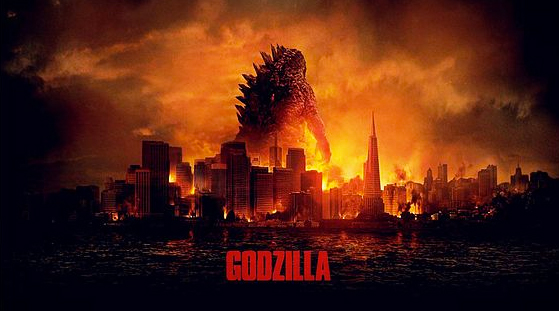Godzilla 3D ****
Marauding super monsters sent to remind Man that nature needs to take its course sometimes (and knock our cockiness down a few pegs) is the terrifying stuff of many an epic monster movie, as they wade through our cities like a toddler through LEGO structures. It’s easy to just repeat endless scenes of destruction and cause an assault on the eyes at the same time (Transformers, for example).
Godzilla (2014) has a ‘different’ take; one that has more significance and thought behind it, one that almost builds a character arc for the leading beast himself. Intriguingly, even though we don’t get to see Godzilla, one of the M.U.T.O. (massive, unidentified, terrestrial object) until a good 40 minutes in, standing tall in his full scaly glory, low-budget Monsters (2010) writer-director Gareth Edwards teases us with visual snippets to get a sense of every anatomical part of the beast in and out of water. The result is an exhilarating build-up – with not quite the storyline you initially expect (even though it’s the standard ‘saving the day and mankind’ variety).
The film begins in Japan, where scientist Joe Brody (Breaking Bad’s Bryan Cranston) who works at Janjira nuclear plant near Tokyo, picks up unusual tremors that don’t follow the usual pattern of an earthquake. His superiors are not keen to discuss. Brody suspects they and the Japanese government are hiding something bigger and more worrying, resulting in an accident that leads to personal tragedy. Returning 15 years later to the supposed radioactive site to follow through his theory, Brody gets arrested. His now adult son and US Army bomb expert, Ford (Aaron Taylor-Johnson) – who has a young family of his own back in the States – is asked to come and collect him. However, the pair uncovers more than they bargained for and mankind is under threat.
Edwards has put his special effects background to highly commendable use here, having honed his skills in the £250k Monsters that roused thrills in its suggestion of sinister monster activity, without visually showing everything. He does the same here, but wisely uses the far, far bigger budget, leading with the personal dramas of the main human characters to actually drive the story, rather than theirs being an after-thought while we wait for the next monster action scene. The best thing about Edwards’ version is he reverts back to the original production company, Toho Co.’s tale of linking global nuclear testing with covering up something bigger. Hence, Man’s arrogance at scientific superiority is challenged by nature; our punishment for that is the M.U.T.O.
Cranston is excellent as the obsessive, paranoid Brody; we get a real sense of his professional frustrations and personal pain. He’s also the man against the corporate machine, the non-conformist we all like to egg on to uncover the mystery. Where Godzilla feels like every other disaster movie is the inevitable US military might in force – as you might expect, considering where the film’s set. Even so, rather than all guns blazing – thought there are a lot, Edwards still manages to keep things focused on the personal angle, with Taylor-Johnson as Ford guiding us through his own familiar struggles while trying to save the West Coast. The schmaltzy ending is a given too. However, this can be forgiven because Edwards delivers on everything else.
As for the M.U.T.O.s, it’s like watching a nature programme rather than a ‘crashing n bashing’ action movie. We get a very real sense of how they function and reproduce and their objectives. At the end, we have an unlikely hero that is set to ride the wave of success on this obviously lucrative franchise from the open ending.
Godzilla (2014) is an epic monster movie reboot that looks great on an IMAX screen – though, again, it’s questionable whether 3D does anything of grander note in the apocalyptic-styled, gloomy design than add a bit of depth and more cost to the price of a ticket. Its focus on the characters’ personal journeys makes it far more satisfying. Better still, its monsters have a purpose other than providing target practice for the gun-ho military. There is even a sense of niggling injustice as man decides who is more important in the pecking order, stirring any animal welfare feelings in the process. Species verses species it is, but who has the right to decide who is more important in nature’s game? Yes, you can get more than a little philosophical after watching this, but don’t miss the start of greater things to come…
4/5 stars
By @FilmGazer
